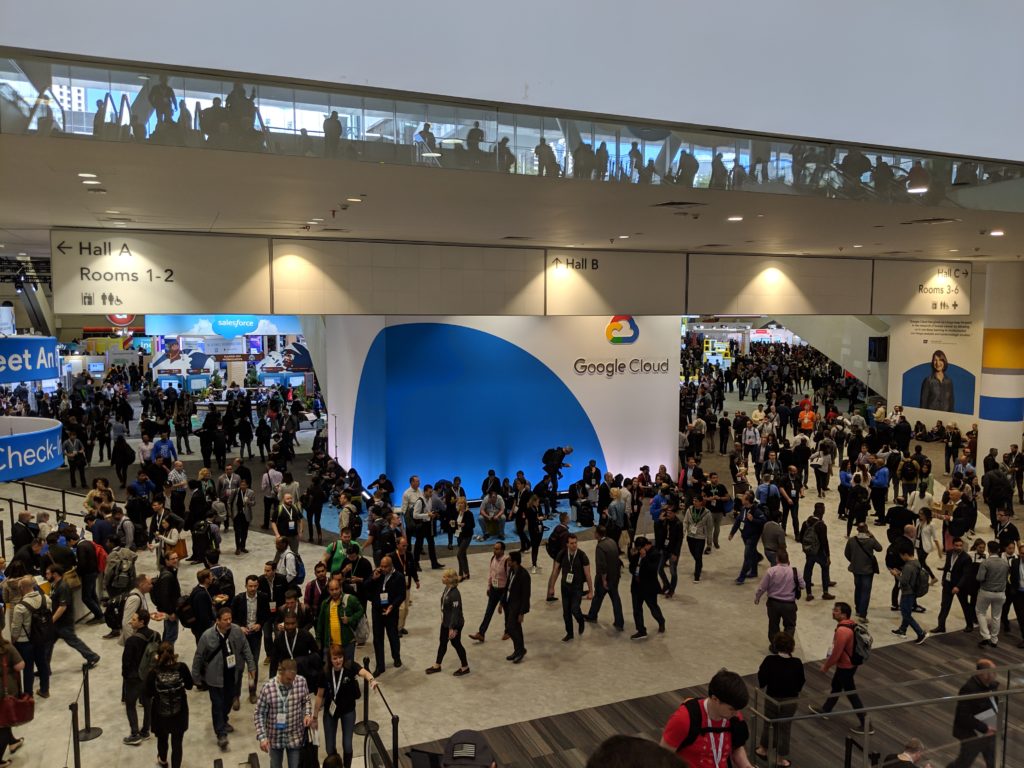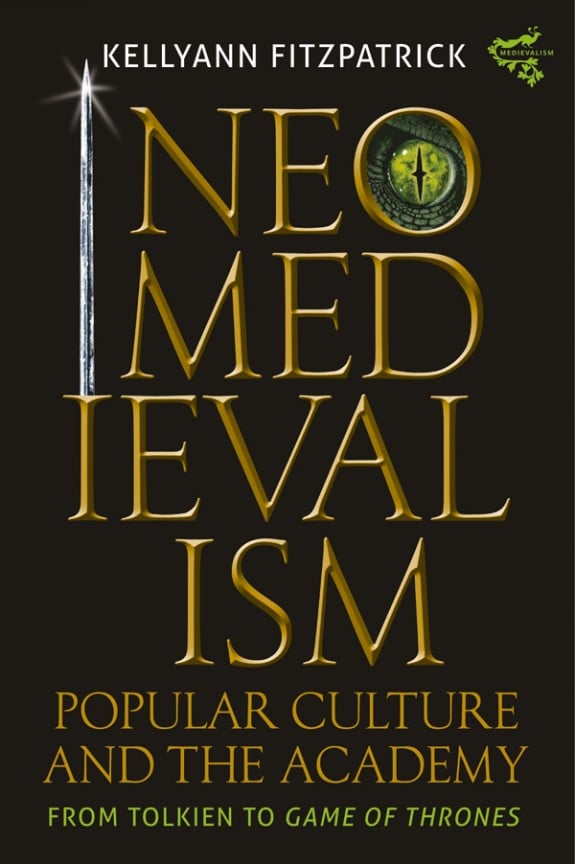
kelly: (Kelly Fitzpatrick) Last week y’all headed out to Google Next (while I was taking one for the team by eating chocolate and drinking wine in Zurich). By way of catching me (and anyone else who could not be there) up, what were your general impressions of Next?
sogrady: (Stephen O’Grady) It was a much larger event than it’s been in the past, and clearly one aimed at communicating to the market a renewed focus on the enterprise.
monkchips: (James Governor) Generally pretty good. New CEO Thomas Kurian’s coming out party went pretty well, all things considered. The themes were very much his. As Stephen says the event felt a lot bigger too – on Thursday Kurian mentioned 35k people.
Enterprise! Tech! Conference!
sogrady: Between the discussions of the enterprise engagement logistics and the stream of enterprise brands:
I like the look of @GCPcloud’s new customers. Mainstream “boring” enterprises:
McKesson, JP Morgan Chase, National Geographic, Sprint, USA Today, Viacom, DISH, Unilever, Procter & Gamble, IKEA, Tyson Foods, Nestle, Bose, UPS, Renault, Samsung, UNC Chapel Hill, others….— Matt Asay (@mjasay) April 9, 2019
rachel: (Rachel Stephens) Agreed on the enterprise messaging front, on stage but especially in the analyst day.
monkchips: Boring = $$$
sogrady: Google is definitely trying to make Enterprise happen.
kelly: There was some talk on Twitter about the mainstage messaging differing from what you heard at the analyst day; any further thoughts on that?
sogrady: At the analyst day, the enterprise messaging was everywhere, and announcements like the commercial OSS partnerships got a bit less airtime. On the main stage, the enterprise messaging was a bit less dominant, allowing for more focus on Anthos, OSS partnerships, etc.
rachel: But I think it was good that they targeted their messaging. One of my notes from analyst day was “I’m digging how much they talked about contracts – minutia matters”
That level of focus on details would not be good for a keynote but was good for analysts.
sogrady: Indeed. Different messages for different audiences is always a RedMonk recommendation.
monkchips: From my perspective it was really a question of tone, and framing
pretty much the first words from Thomas Kurian to analysts #GoogleNext19: "Customer empathy, you have to understand where they are, how you can help them. Every legacy system exists for a reason. Meet customers where they are and be deeply sympathetic". empathy, sympathy, legacy
— Grumble Bundle (@monkchips) April 8, 2019
not much of that made it into the main stage talks
I was lucky enough to have a meeting with Thomas Kurian on Thursday, and ask him about the difference. He just smiled, quite winningly, and said: “well I just had a lot of material to get through”
sogrady: @monkchips That’s exactly right. It might seem counterintuitive that an enterprise-focused message would include such an emphasis on empathy, but it is vital that a company like Google – that lives in the future from a technology perspective – engages with an understanding that not everyone is there yet.
You see this in sports at times, when the best players make bad coaches because they don’t understand why every player can’t do what they did. Empathy will be key for Google.
monkchips: Love your sports analogy, Stephen. This will represent a sea change for Google. Meeting the customer where they are, being interested in tech problems that aren’t Planetary Scale, just being helpful and holding the customer’s hand.
sogrady: This was a near exact quote from one of the Google execs: “We had a tendency in the past to come in and say ‘run like Google,’ but we have to meet them where they are and have empathy because they’re often inheriting a mess.”
monkchips: But coaching, especially data-driven coaching, can improve any company’s go to market. That was another comment I really liked by Kurian. Some people have misread him that he thinks all he needs to do is hire more sales people. I was more interested in what Rachel calls the minutiae. Kurian said he wanted to identify the “pauses” in the enterprise sales and engagement cycle, and fix those, to become an easier partner to work with.
Rather than being purely outcomes-focused
kelly: I love the emphasis on empathy (and especially on inherited mess)! And on partnerships. The OSS partnerships were part of the buzz that we were hearing even in Switzerland. For those of you who were at the event, what were some of the key takeaways?
sogrady: Before I get to that, let me just follow up on the prior question, because I agree that Kurian’s comments on hiring seemed to be misinterpreted. Everyone I talked to said they are hiring “everywhere.” Which is what they should be doing, the big question for me is how they hire at the volume they need to given the high – maybe problematically so – bar their hires have to clear.
monkchips: maths

sogrady: But regarding the takeaways OSS partnerships were a big one, along with the enterprise which we’ve already talked about. Those two and Anthos were my Big Three.
monkchips: I still can’t believe Stephen blew Google Cloud’s biggest announcement with a mention earlier in the chat, without even giving me a chance to make my Alexander Dumas joke about the fifth musketeer, Anthos. Stephen – for our readers what even is Anthos?
sogrady: lol
rachel: Wait, who’s the fourth musketeer? I need to brush up on my musketeer knowledge.
monkchips: D’Artagnan
sogrady: The short version for me is that Anthos – formerly the Cloud Services Platform – is Google’s cloud middleware offering. A mix of Kubernetes, Istio and other tech, it’s a software layer that runs on GCP, but also on prem or other clouds. It’s WebLogic or WebSphere for the cloud era.
monkchips: Not so great for Cloud Foundry, a clear shot across the bows at OpenShift. It’s game on for the enterprise secular shift around containers
sogrady: Anthos is interesting in its own right, but also means that GCP is effectively now an enterprise software company as well as a cloud infrastructure company. One big question is how long it takes the company to earn the trust necessary for that role.
rachel: I do think Anthos was their biggest technical announcement, and it will be interesting to watch the market response.
I agree that trust is crucial. It’s a multi-cloud play for workloads, but I’m not certain market permission currently exists for Google to sit at center of the enterprise multi-cloud strategy.
monkchips: I thought Rob Sadowski (Trust and Security Marketing Lead, Google Cloud) said something really interesting at the event in that light: “The repetition of good interactions drives trust”. Google’s success won’t be a one shot deal, enterprise trust is always about the ongoing relationship, the after service, the going the extra mile, the being there.
kelly: So we’ve heard about what the Dumasian Anthos might mean for Google’s competitors; are there any other announcements from Next that competitors should be watching?
monkchips: My favourite was definitely Google Cloud Run. Didn’t get a lot of attention in main tent, but for serverless nerds it was the goods
With Cloud Run Google Cloud has essentially packaged up container-based development and deployment workflows that map to how developers work today – GitOps if you like, to make it really easy to deploy stateless container-based apps, from Docker, through Google Container Registry to deployment, without the developer needing to think about URLs, SSL or a load of other yak-shaving issues. Google has taken Knative and made it consumable.
sogrady: That’s the difficulty with large events: even cool bits of tech like Cloud Run can get lost amidst the sea of competing announcements.
rachel: But I feel like there was a noticeable difference in how Google did announcements compared to Re:Invent. I feel like the AWS keynote is a barrage of announcements, and it feels like Google really did try to curate what it presented to have that enterprise focus.
The cynical among us will say it’s a different pace in innovation (and AWS is definitely a behemoth on that front) but also I think credit to Google to try to make consumable themes.
monkchips: Rachel that totally makes sense. It might have been accidental, but Kurian is very clear about what he considers message discipline.
Even down to technical presentations in his keynotes. For example, the data management section was all about a fictitious Logistics company. Then moments later they introduced UPS. Logistics is of course a market where AWS is a big competitive concern. Folks like DHL are pondering their options. Similarly to the Retail industry vertical
sogrady: Anyway, regarding other announcements, the big one for me was the commercial OSS partnerships. The OSS partnerships were interesting, because of the seven announced, five were with vendors who have undertaken drastic, and problematic in my view, license changes in an attempt to protect themselves from AWS.
monkchips: Regarding OSS partnerships I am both heartened by Google’s announcements yet also rather skeptical. It makes for good keynote fodder, the idea Google is a better partners for folks like Elastic, MongoDB and Redis than AWS
But the question is whether such positioning is sustainable in the long term is open to question. Google has its own data management products, which are excellent, and my suspicion is Kurian would rather see Google Cloud selling BigTable BigQuery etc, rather than third party tools
sogrady: The implications for OSS broadly are pretty minimal, because enabling a handful of hybrid licensors has no broad implications for the sustainability of OSS outside of that world.
monkchips: Meanwhile the keynote made nice with data management providers, while Anthos arguably put a number of VC-funded companies in the Cloud Native space on notice. Give with one hand, take with the other
sogrady: That being said, if Google can establish itself as a or the preferred destination for commercial OSS vendors, that’s an interesting opportunity. One that, frankly, Azure seemed to have had the best opportunity at, but have not fully capitalized on.
As a side note, it’s interesting to see how cloud vendors are jockeying for the moral high ground. AWS looked for that with its Elastic positioning, and Google in turn sought to do that for Elastic.
rachel: It definitely felt more strategic than moral.
monkchips: Also let’s note that Anthos is not open source. Istio is not part of a foundation. Google is arguably in a bit in a holding position, while Amazon Web Services on the other hand is stepping up its OSS contributions
rachel: While also forking (without calling it forking). All the cloud providers are giving with one hand and taking with the other.
Such is the nature of platforms.
monkchips: Indeed Rachel. True that.
kelly: Stepping back to look at Next more broadly, any other notes on what Google did right and wrong at the show?
sogrady: Not holding the event in Las Vegas was very much right.
monkchips: Keynote on day one ran to time. Yay!!! That was good. On Day 2, it overran, and began to feel a bit like an advertisement section for Google customers. Not so good. As Stephen says not being in Vegas is a win.
rachel: The event overall conveyed a new discipline for GCP, both in how the event was run and how it was messaged.
And I think that ties back to Kurian and their renewed focus on enterprise.
kelly: And one final question: a year from now, what will be the announcement from Next 2019 that we look back and recognize as the most important?
sogrady: I’m tempted to say the commercial OSS announcements, but actually I think it’s Anthos. That single announcement fundamentally changes the nature of what GCP is. While Google’s had off prem announcements before like GKE On Prem, Anthos was a big, visible bet that GCP can be a software company. Whether it succeeds or fails, it will be the most important announcement.
monkchips: Kurian visited 450 customers in his first 3 months at the firm. I was reminded of the Louis Gerstner playbook when he took the reins at IBM. After visiting a ton of customers he came back and said: “the last thing IBM needs is a Vision”. I am not sure any particular announcement is what to focus on – though Anthos is significant – but rather execution, a clearer focus on the enterprise. Google has arguably wanted customers to be a better version of themselves. Now Kurian needs to turn Google into a better version of itself – better, more engaging, easier to work with, the convenient default option. It’s about execution from here on in, if his stewardship is to pay major dividends
rachel: I think what struck me was not a single announcement, but rather the whole of their enterprise messaging. Google’s been widely acknowledged to excel in their tech, but have historically been hard to work with. If they can start executing on both fronts, they will be a much more formidable competitor.
damn, I think that counts as a jinx but in which you were more eloquent.
kelly: It is ok for two monks to agree!
monkchips: I agree!
kelly: And on that note, I’m calling this a wrap. I (and my FOMO) thank you for the recap and the predictions.
Disclosure: Google is a RedMonk customer and paid for T&E to Next. The following companies (also mentioned above) are RedMonk clients: Amazon, Elastic, IBM, Microsoft (Azure), MongoDB, Oracle (WebLogic), and RedHat (OpenShift).

No Comments